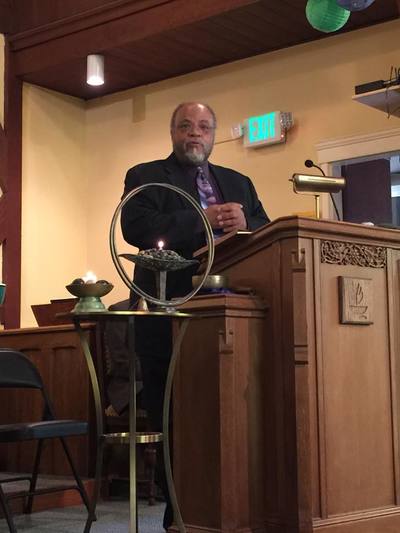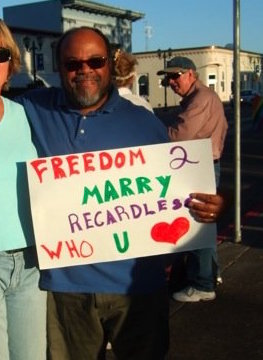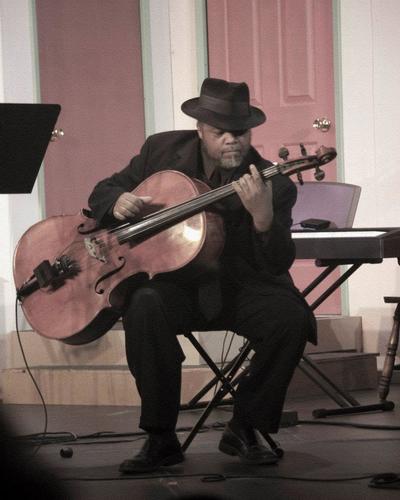Justice through Creativity...
|
I wrote this essay a long time ago! A friend told me that I am suffering from "Post-Modern Depression", a vague term he used to describe the condition we all suffer from, here in the sunny state of California. I was telling him about a trip I had recently taken to Mobile, Alabama; how being back in the place where my parents originated was strangely like "going home" to me, and the realization upon my return that I live in a moral wasteland. I was complaining that this area where I live, around the San Francisco Bay, must rank as one of the worst places to attract people of the opposite sex who are interested in a long-term committed, monogamous relationship. I have given further time to this thought, and have concluded that the problem is far deeper than simply finding a suitable mate. I believe that many of the difficulties we experience as a society are because the basic moral infrastructure; the assumptions we have concerning our behavior towards one another, is left in shambles in the wake of the "come back from the war, make babies and suburbs" mentality of the 50's, the sexual revolution of the 60's, the moral relativism of the 70's, and the "me-first-greed-is-OK" attitudes of the 80's. We Americans, and most especially Californians, have lost our sense of community. Indeed, one can make a real argument that Americans do not have a meaningful sense of community (and by extension, a culture) because we are a nation of immigrants divided into many separate communities. Couple that with the "go west" frontier mentality that permeates our collective conscience and it is not hard to see that we experience social schizophrenia on a personal, as well as national scale. The idea that we should all be capable of fending for ourselves after the age of eighteen, striking out on our own to seek the American Dream of your own home surrounded by a white picket fence with a two car garage and 2.5 kids to go in the cars is very much alive. The post-World War II doctrine combined this strong sense of the individual with the ultimate expression of individualism —the house in a suburb, complete unto itself and removed from the larger community of a city, nestled deep in the bosom of quasi-community. The suburban house often did not come with a common park area which could function as a village square. The idea of the suburb was to allow people to be on their own . .. not to be encumbered by small town gossip, not to be held to the same values as others, not to be expected to attend the same church that everyone else did, and not to have to work in the same factory. The automobile helped things along by providing us with the freedom to travel at will. The suburbanite did not need to share a train or bus with others. Instead, he or she could go to work in the privacy of their own padded four-wheeled cell. So the sense of belonging to a group of people who share common interests and values was replaced by the concept of a "bedroom" community; a place where people happened to live because they can afford to live there, and where they literally went to sleep at night, all without significantly contributing to a community. I do not mean that suburbanites of the 50's and later do not contribute their tax dollars to their communities (so they can build more freeways), or that they did not attend PTA meetings. I mean that suburbanites all over this country have not significantly contributed their spirits to the places they live. They do not imbue the places they live with the spirit of community, the spirit of trust, the spirit of belonging, the spirit of giving, and the spirit of responsibility towards one's neighbors.
As a single man in my mid-thirties, I have met many people who are what I call "emotionally disenfranchised". These are people who, for the most part, lived here until they were old enough, went somewhere else to college, and have now returned to the Bay area. They have families here, although many of their friends have moved away. They are confronted by massive traffic jams, shopping malls, stores, and homes that spring up like mushrooms, and most importantly, the sense that the community they once knew is being constantly replaced by something much less permanent. Just as the physical landmarks they relied on when they were growing up have changed, so too have the emotional landmarks changed. A place that was once a wide open field to play in is now a condominium development. Their high school or college friends are all now scattered to the wind, leaving no one in their place. It is hard to make new friends who are not already married—if not to someone else, then to their jobs, or to themselves. So the feeling of being disconnected from the community, disconnected from your friends, and disconnected from yourself is very intense for people of my generation. The dangerous thing is that many of us seek marriage as the answer to the emptiness inside. The need for community, the longing to belong to something greater and more permanent, and the sometimes desperate search for meaning in life is too great for any spouse or "significant other" to bear, so our marriages all too often end in divorce and our significant relationships end in utter disappointment. I did not arrive in my mid-thirties as a single man by choice. In fact I was married for three and a half years until my ex-wife left me two years ago. I cannot say with certainty that the extreme anger towards men that eventually surfaced in my ex-wife during the final months of our marriage is a direct result of her parent's whole-hearted plunge into the sexual revolutionary pool of the 1960's. I cannot say with certainty what caused her to abruptly seek therapy, and why she began to say that she was questioning everything in her life including her sexuality, our marriage, and what her favorite colors really are. All I know for certain is that during one of joint therapy sessions two years ago.. . she told me she is a lesbian. She also said she married me thinking that by doing so, she could change what was so deeply ingrained in her. Granted, my experience as a casualty of the sexual revolution is a little more extreme than what most people have possibly encountered. The point is that all of us have been effected by the more insidious nature of the sexual revolution, where we were all given license to sample from a smorgasbord of up to then forbidden moral experimentation. The problem is not that the sexual revolution happened, but that it did not offer us anything better than our repressed sexuality in return. We were not enriched, enlightened, or fulfilled by the sexual revolution. Instead we are left with a generation of people who are in deep confusion about the meaning of sex, the role of sex as the partner of love, and the responsibilities that sex brings with it; and more than that, their parents who are still reeling from the consequences of their decades-long walk on the wild side. So here we are with two strikes against us—people who are emotionally disenfranchised from their communities, who are confused about the meaning of sex and deeply intimate human relations. Morality, that outdated term, took a back seat to relativity in the decade of the 1970's. Relativism became the best model for how to relate to one another. Anton Levy's "Satanic Bible" made its rounds among the intellectuals at my high school (yes even at a high school in Biloxi, Mississippi!), preaching its own rather odd version of relativity. Levy's premise is essentially that Satanists are a misunderstood minority of people who just happen to acknowledge that human nature is not to turn the other cheek but to smash anyone who gets in our way, and that Satan is just the guy to worship while you are a human being because he represents the all-too-natural hedonism that is our birthright. The message to us from all sides at the time was, "It's your thing. Do what you want to do." Within a few short years educators had dumped any reference to morality in the classroom. I know this for a fact because I can remember starting our school days with a prayer and I can remember very moralistic lectures on such topics as "citizenship" and "values". When I was a young child we were even graded on this rather nebulous and arbitrary "citizenship". I'm not making a case for school prayer. I always thought it was dumb and downright rude to be subjected to a prayer while I was in school. The point is that educators, in a very short time, ran away from the idea of teaching values and morals like the plague. The replacement philosophy, however, was far from desirable. In fact, the schools could not offer a replacement ... and that was the problem. There was a paucity of any kind of training in values. What seems to me to have made matters worse in this regard, was sex education. Not that sex education is, in itself a bad thing, but sex education outside of the context of values or at the very least, ethics, seems to me like telling a blind person how to use a video camera. The well-intentioned value neutral curriculum has resulted in a bizarre state of affairs. We attempt to teach young people today about such issues as world-wide pollution, AIDS prevention, drug abuse, sexuality, and the responsibilities of citizenship while their parents, as well as their teachers live in the moral wasteland of their own making. Media, the true educator of the new generation, teaches our children much about human values. In the course of a six-hour sitting in front of a television a child can vicariously experience discrimination in the form of the silly rabbit being told that "Trix are for kids", violence in the form of a cartoon character being blown up, confusion about violence because the cartoon character returns for more, marital fidelity by watching two day-time soap opera actors who are not married to each other having sex, and the evening news with its attendant police beatings of motorists. The child could even manage to catch a little MTV and learn all about moral relativism from the lyrics of popular songs and the images that flash so quickly on the screen. Ask children today about important human values, ask them what it's like to live in a family, or ask them to tell you what they think about sex and you get some pretty interesting answers. Children will more often than not, shrug their shoulders and say "I don't know what you're talking about". Remember, these are the children of people for whom the statistical probability of staying in a marriage is against them, and who both must drive miles to work every day from their suburbs, leaving these same children in the care of others. The parents, people of my generation, cannot easily pass on a sense of community, a clear idea of the role of sexuality in their lives, or strong values and ethics to their children because they do not feel these things. And this wrongly assumes that the children described actually live in a family where there are both parents. So here we are with three strikes against us—people who are emotionally disenfranchised from their communities, who are confused about the meaning of sex and deeply intimate human relations, who have children who don't understand the first thing about values (taught by people who don't either). Ethics, the study of standards of right and wrong; the part of philosophy that deals with moral conduct, duty, and judgment, is sadly lacking in our society. From the top down, a philosophy that espouses moral conduct, duty, and judgment is missing from our institutions and the people who run those institutions. The "me-first-greed-is-OK" attitudes of the 80's have come home to roost with a vengeance. The Iran-Contra scandal, the savings and loan debacle, the huge corporate buyouts with the corruption they bring, the massive deficit that will be passed on, and the fall from power of highly visible church leaders has effected all of us. Think now of our children. What is the message they get from all of this? The cynicism we feel towards our communities, our social institutions, and our government is passed on like a torch to our children. A generation of "latch-key" people will be with us very soon, indeed. This generation will have learned that you must do whatever it takes to get ahead—that the end justifies the means. An Oliver North who sits in front of a congressional hearing and proudly describes how he and others subverted the Constitution to achieve their own goals is not so much a danger to our present society, but is infinitely more dangerous to the society of the future, whose leaders will have taken the lessons of North to heart. The corruption of the spirit, which starts first in the individual spreads throughout our communities, our cities, our states, and our national government. In what was not a very thinly veiled national exercise of the ''me-first-greed-is-OK'' doctrine we involved ourselves in a war of "liberation" to free Kuwait from the tyranny of Saddam Hussain. The same president who so adamantly pummeled Hussain at every turn for his brutalization of the people in both Kuwait and in his own country was curiously silent as regards to the equally brutal massacre of thousands of democracy movement demonstrators in China. Why? Because it was simply not in our best interest to do so; China does not supply us with oil. Even a child can draw the circle of moral equivalence around that picture. It occurs to me that we are out of phase with ourselves. Our psyches cannot catch up with the circumstances of our lives. We cannot take the time to think about what is happening to us as we go about our daily business, so what we do every day begins to define us, and it encroaches on our perception of ourselves so much that we become remarkably confused about who we are—not what we do. We live and work in a society that makes greater demands on us. Because we can physically move rapidly from one place to another, we expect that it should be just as easy to move ourselves emotionally. The problem is that there is an increasing number of people who are simply unable to make the unthinking emotional sacrifices that are demanded of us every day. Those of us who are in our thirties and forties are suffering from "Post-Modern Depression" but we don't know it because we cannot recognize the symptoms. We have been socialized into a dulling of our spirits ... indeed, to believe that we are not spiritual beings at all. We seek meaning and purpose in our lives from the very things that rob us of them. It is vitally important for us to understand that we need to take time out to reflect on our lives—not to do something else with a day off, but to consider how the life we lead has effected us, and to think of ways to improve the quality of our lives. That quality has nothing to do with the car we drive, the job we may (or may not) have, the house we live in, or the things we do for recreation. If the quality of our lives does not satisfy the requirements of our spirit, then I submit that it is time to give some thought to how your life can be changed. So here we are with four strikes against us—people who are emotionally disenfranchised from their communities, who are confused about the meaning of sex and deeply intimate human relations, who have children who don't understand the first thing about values (taught by people who don't either), who live in a country where the government does not behave ethically or fairly. From the top down and from the bottom up we Americans are in trouble. I myself, am not a bleary-eyed expert on such subjects as sociology and the impact of "future shock" on our society. I am simply a person who calls out to the sisters and brothers of my generation to look deep inside themselves and face the dragons that are there.
0 Comments
Leave a Reply. |
About this blog.This blog is a place where many of the confluences of my life can be shared. I am, at the core, a creative person. I approach everything from that basis... whether composing symphonies, playing the cello, being a serial entrepreneur, writing sermons and essays, flying airplanes, or creating software apps. I am deeply passionate about creativity, issues of social justice, and spiritual enrichment. These are fundamental to everything I do. Welcome to my journey! Categories
All
Archives
April 2024
|




